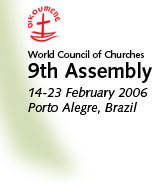 |
WCC > Home > News & media > Features | ||||
| About the assembly | Programme | Theme & issues | News & media | |||||
 |
|
||||
|
14.02.06
The exhibition hall: Sharing stories and meeting people
by Mark Woods, Walt Wiltschek and Stephen Webb (*)
More articles and free photos at
Assemblies of the World Council of Churches see Christians from all over the world come together, and many church-related groups take advantage of the display window this event provides. More than 100 groups are represented in dozens of booths in the assembly's exhibit hall adjacent to the main plenary space on the campus of the Pontifical Catholic University in Porto Alegre, Brazil. Colourful displays cover a variety of issues and topics representing all geographical areas of the world.
In one corner of the hall, seven ecumenical "umbrella" agencies - such as Oikocredit, Ecumenical Advocacy Alliance and ECLOF - are sharing a common space. Linda Hartke, coordinator for the Ecumenical Advocacy Alliance, said the groups decided to cooperate since they work in similar circles and could have greater impact together. The joint effort, titled "Acting Together - Transforming the World", is focused on distributing educational material and showing videos in a mini-theatre.
A latecomer to the exhibit hall was the Changemaker programme of Norway and Finland, which was on a waiting list for space until a cancellation made a booth available. The programme is funded by church agencies in each country but run by youth who work on topics such as climate change, international trade, human rights and HIV/AIDS. Changemaker sponsors national camps, leadership training events and study weekends, as well as organizing public witness efforts.
"We mobilize youth in our own country to join political campaigns to try to influence decision-makers and let young people see that they actually can do something to make a change", said Camilla Sandbakken, who works with Changemaker in Norway. "We hope that it's an inspiration for other youth around the world to work at changing the world".
Not far from them is the Clean Clothes Campaign (CCC). Founded in 1990 in the Netherlands, CCC aims to improve working conditions in textile and garment factories in developing countries. Wages are often low, there is routine sexual harrassment, and working conditions are often dangerous. "This is a very important place for us to be", said Dietrich Weinbrenner. "There are delegates here from where the workers are, and from where the buyers are. We wear the third world on our skin".
Ecology, the environment and agro-ecology were the themes of many displays.
The Lutheran Foundation of Diakonia from Brazil (heir to the Lutheran Church's Development Projects Service) has supported education, health and family agricultural projects for more than 30 years. Its work is based on love, hope and a faith that witnesses to the world as God's creation. Its programme includes promoting reflection and dialogue on sustainable development to strengthen civil society and foster social, economic and environmental human rights. Prominent among the books on its counter is Herbanario da Terra: Plantas + Receitas.
An organization with a more specific focus is Comissao Pastoral da Terra, which has 350 jars of seeds from endangered native plants on display, along with T-shirts, books, hats and CDs of poems and music about the land. The seeds originate from the traditional cultivation of vegetable species, without the use of agricultural-chemical products.
Natural seeds used by traditional farming communities serve as a guarantee of ethnic-environmental diversity. Native seed varieties are regarded as a gift of God, a heritage of peoples and a symbol of autonomy; however, international companies now produce hybrid and transgenic seeds, threatening countries' and people's sovereignty. Comissao Pastoral da Terra urges Assembly participants to join the campaign to recover and protect the variety of native seeds and thus to preserve life on the planet.
Meanwhile, the Trust for Community Outreach and Education from South Africa, an organization that focuses on land and agrarian reform, has a photo exhibit entitled "Our land, our life, our future". The trust extends an invitation to attend similarly themed events in the Mutirao programme.
The Salvation Army is present with a display depicting its work in 111 countries supporting women and children in the areas of human trafficking, education, health and income generation. Beautifully handwoven textiles from Bangladesh provide a glimpse into one of the Salvation Army's projects. "We want to help people feel that they are persons of worth", said Joan Canning of the exhibit's staff.
India's Church's Auxiliary for Social Action (CASA) is a partnership of 29 Orthodox and Protestant churches working in relief and development. In the wake of the 26 December tsunami last year, CASA is helping to plan and rebuild villages which were destroyed, with new cyclone shelters and pastoral care schemes. Its approach is locally based, with groups of villages working together on redevelopment projects. "We wanted to show the global church how the church in India is trying to respond", said Sam Selwine.
The exhibition area is likely to see continuous activity over the period of the 9th Assembly, with many valuable contacts made between exhibitors and participants.
[799 words]
(*) Mark Woods is a UK Baptist minister and editor of the Baptist Times.
Walt Wiltschek is editor of Messenger, the denominational magazine of the Church of the Brethren. An ordained minister, he lives in St. Charles, Ill., in the United States. Stephen Webb is media officer for the New South Wales Synod of the Uniting Church in Australia.
Assembly website:www.wcc-assembly.info
|
|||
|
|
|

